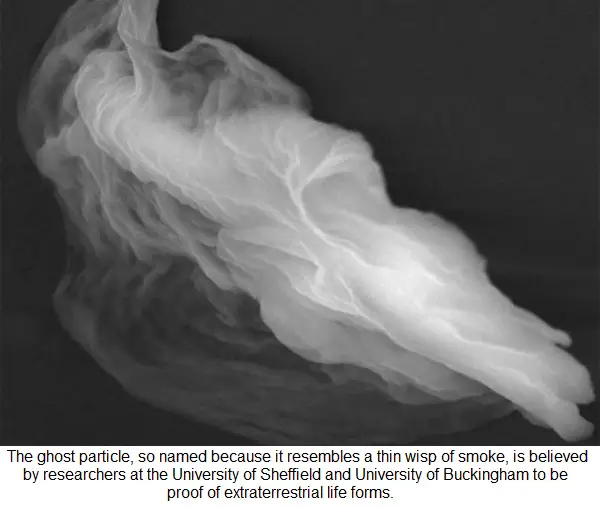
Researchers believe the proof of the existence of alien life has been discovered with the discovery of a ghostlike particle taken from a number of miles from the Earth.
Daily Express released an image of the specter-looking particle from a team of astrobiologists at the Universities of Sheffield and Buckingham. Ten microns in width or around as thick as a single strand of human hair, the particle looks like a wisp of smoke or a chiffon scarf.
Professor at the University of Sheffield, Milton Wainwright, theorizes that the ghost particle is a living balloon that held alien organisms at some point. Wainwright also believes that the particle, which likely in its deflated state, could be inflated using gasses that are lighter than air by these organisms. This scenario allows the particle to float in the air or seas of unidentified environments.
Wainwright and his colleagues say in a paper published in the Journal of Cosmology that the ghost particle is the cell wall (frustule) of a diatom, a type of microscopic algae. To gather samples of particles in the stratosphere, researchers sent balloons 22 to 27 kilometers (14 to 17 miles) into the atmosphere of the Earth in July 2014. Researchers believe that the ghost particle may have been sent by a comet.
Wainwright says that it is assumed by most people that these biological particles just drifted up to the stratosphere from Earth, but it’s generally accepted that a large particle such as this can’t be lifted from Earth to 27 kilometers for example. Wainwright notes that a violent volcanic eruption is an exception, but no such activity happened within three years of the sampling trip.
However, as expected, skeptics exist. Astronomer at SETI in Mountain View, Seth Shostak, says that Wainwright theory is only credible over short distances, such as in solar systems. Shostak also says the idea that life being transported by objects such as comets will have to stand up to further examination by the wider community of scientists.
Wainwright insists that the particle, which is made up of oxygen and carbon, appeared on the sampling stub in pristine condition and nothing could suggest that it is contaminated by Earth particles, such as pollution particles, grass, or pollen. He also notes the impact craters on the particles as additional proof of their space origin.
Chris McKay, astrobiologist at Ames Research Center of NASA, wants more proof than what Wainwright and his colleagues have been presented. He says that while Wainwright and his colleagues discovered curious stuff in the Earth’s atmosphere, he still takes the principle that says extraordinary claims need extraordinary proof, which made famous by Carl Sagan.


Honest Science Should Practice
S. C. I. E. N. C. E.
This is to say….
Strategic
Calculations to
Identify the
Extraordinary by
Non-partisan
Conclusion through
Evaluation
These findings are fact-based, regardless what NASA has to say.
Yeah and I have alien creatures living on my eyelashes.!!!
Fascinating hypothesis.